
You post. You wait. And then…silence.
Maybe a few likes trickle in, but nothing that shows real interest. Meanwhile, other brands in your space seem to catch fire overnight. It’s frustrating, right? You know your business is solid and your product works. So why do your posts keep vanishing into the feed?
Here’s the thing: most brands aren’t ignored because they lack effort. They’re ignored because their content doesn’t connect. It looks fine on the surface with nice visuals and decent captions, but it doesn’t speak to people in a way that feels memorable.
Let’s fix that.
When content makes people stop scrolling, it’s rarely because of fancy language or perfect design. It’s because it mirrors something the audience already feels. We’ll break down what’s missing from your content and how to fix it so that people actually notice.
Being invisible online doesn’t mean you’re not posting. It means you’re posting, and no one seems to care. You’re actively sharing updates, uploading photos, and running the occasional campaign, but your audience scrolls right past it. There’s no conversation or sign that anyone’s noticing what you put out there.
Invisibility shows up in quiet numbers: low website visits, social posts that barely get a reaction, few branded searches, and maybe the occasional follower who never interacts again. You might have a decent-looking site and content that checks all the boxes, but it sits there collecting digital dust.
Now, contrast that with presence. Presence feels alive. It’s when people start talking about you without being prompted. They tag your brand in their own posts. We see this a lot with American Eagle, as most of their Reels are the marketing videos customers tagged them in.
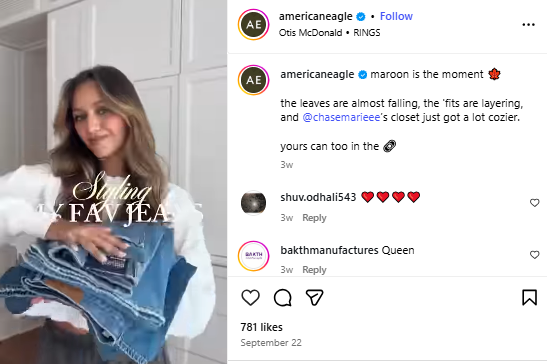
Also, presence is when customers search your name on Google because they heard about you somewhere. They share your content, not out of obligation, but because it resonated.
The tricky part? Many brands mix up being active with being seen. They think posting more equals visibility, when in reality it just means more noise if the content doesn’t connect. While activity fills space, presence fills minds. You need to ace the latter.
There’s always a reason a brand fades into the background. Most of the time, it’s a few sneaky habits that make your content easy to ignore. Let’s break them down.
If your brand sounds like everyone else, it blends right in. You might be saying all the right things, but none of it sticks. People scroll, nod, and move on because there’s nothing new or personal in your message.
A lot of brands fall into the corporate speak trap, so they talk in polished phrases that sound professional but don’t say much. Your voice should sound like a person, not a press release. Gymshark’s athletic and empowering voice is a great example of this in action.
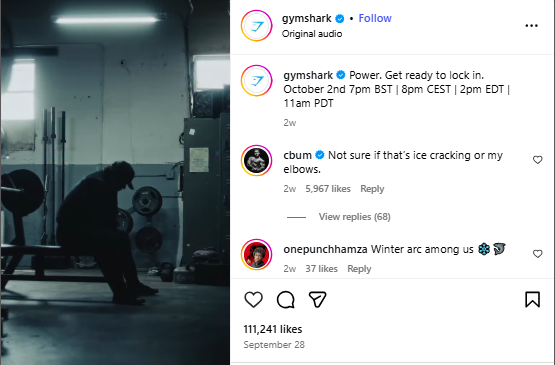
One week you’re posting every day, the next you vanish for a month. That stop-and-start rhythm makes audiences forget you exist.
Online visibility is like a drumbeat; it needs rhythm. If your audience can’t predict when you’ll show up, they stop waiting. And with the average brand posting 9.5x across all channels in one day, you don’t want to lag behind your competitors.
More importantly, regular posting tells people you’re still here, still creating, still worth following.
Here’s a common trap: posting what you find interesting instead of what they need. You might love writing about your internal updates or latest product tweak, but your audience is craving solutions to their problems.
That’s why Mailchimp does so well on Instagram. They share solutions and tips that their audience will actually find useful rather than merely going on about how amazing their product is.

If your content doesn’t line up with what the viewers care about, they tune out. Think of it like joining a conversation halfway through and changing the subject. It’s awkward and forgettable.
If your site doesn’t show up in searches, you’re basically invisible to the people who need you most. Now, this doesn’t mean you have to chase every keyword. But you must understand what your audience types into Google when they’re looking for help. Without proper keyword use, solid meta tags, and a clear site structure, even great content hides in plain sight.
If your tone on Instagram feels fun but your website sounds like a law firm, people get confused. A mismatch in visuals or tone across platforms makes your brand feel unreliable.
However, we don’t mean you have to be repetitive in order to be consistent. You just need to make sure your audience always knows it’s you talking. Every touchpoint should feel like part of the same story.
Lululemon is a good example of this. Their tone is inclusive, and their visuals are diverse. You see this on their Instagram, as they share community-driven content Reels.
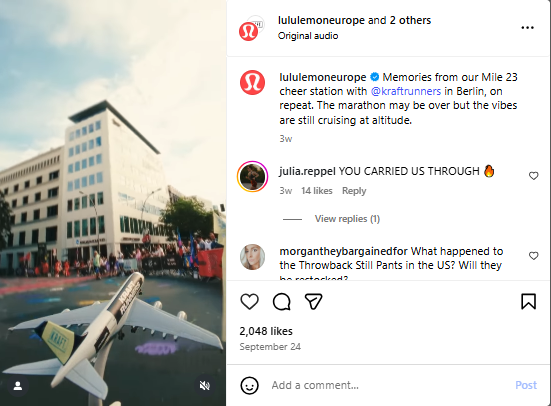
Similarly, when you go to their website, you’ll see a diverse group of models. The visuals are also sleek and clean, just as they are on their social media accounts.
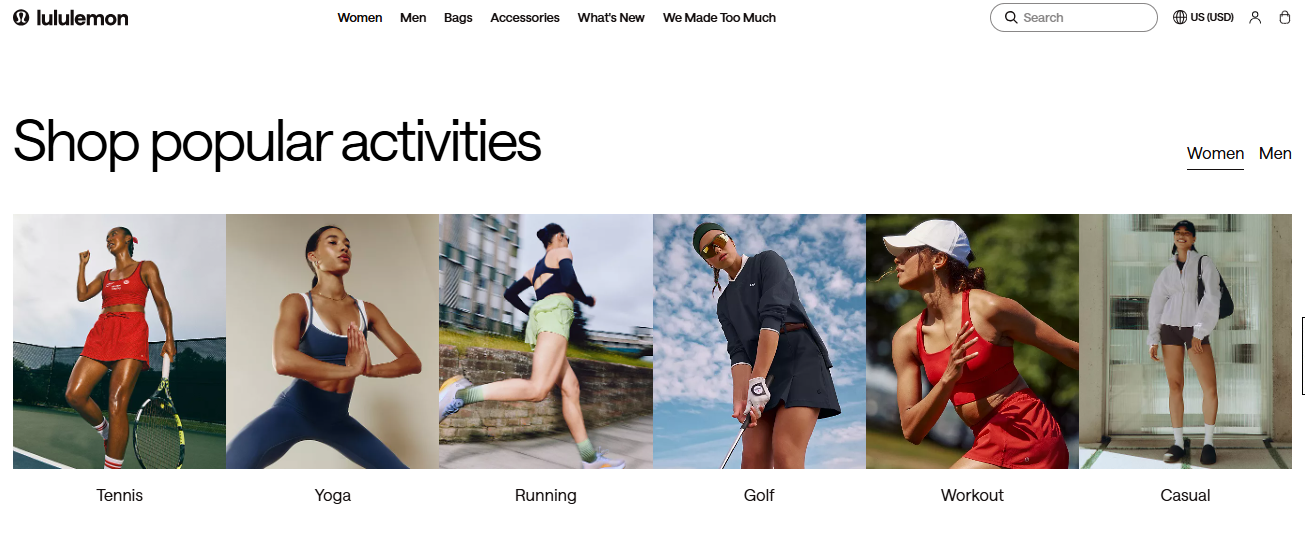
Posting great content where your audience doesn’t hang out is like performing in an empty theater. You can have the best material in the world, but it won’t matter if the room’s empty.
Find out where your audience actually spends time. Then adapt your format to fit that platform. Don’t drop a long-form think piece into TikTok or expect a quick meme to carry your blog. Instead, make sure the content matches its space. That’s how it will get seen and talked about.
If you never check what’s working, you’ll keep repeating the same mistakes. Which posts get comments? Which blogs keep people reading? Which videos drive traffic? Brands that skip measurement stay stuck in the dark because they don’t know what actually connects and what they need to fix.
Content is what turns an unknown brand into one people actually notice. It’s how your name starts to show up in searches, shares, and conversations. But here’s the thing: it only works when you treat it like a long-term strategy, not a quick post here and there.
The right kind of content does three things: it helps, it shows up often, and it gets seen. Helpful content solves real problems or answers the questions people are already asking.
Consistent content builds familiarity because every time your audience sees you again, you become a little more recognizable. And visible content follows the basics of SEO, making sure search engines and people alike can find it easily.
When you combine these pieces, people begin to trust what you say because you show up with something valuable again and again. From there, clicks turn into conversations, and conversations turn into leads.
Now that you know why your brand feels invisible, it’s time to turn things around. Here’s how to do it.
Before you write another post, figure out what makes you you. What’s your point of view? What do you stand for? When you know that, everything else becomes easier.
Write down how your brand should sound (warm, bold, playful, or serious) and stick with it. For example, Taco Bell has a playful tone for its social media content, and you’ll see every post following this voice. Even the audience plays into it, as you can see from the comment section. That’s how you cement your brand’s style.
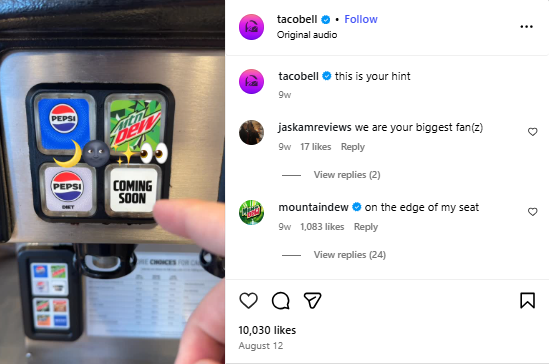
Create a simple messaging guide with your core statements and key talking points. Then, build content pillars that reflect your position in the market. These are the themes you return to again and again, so your audience starts to associate your name with something specific.
Not everyone who finds you is at the same stage. Some are just learning who you are, while others are comparing options or are ready to buy.
Map your content to these moments in the sales funnel:
When content meets people where they are, it feels like you’re reading their minds.
Nothing kills momentum like silence. Decide how often you’ll publish, and follow the schedule regularly. It helps to create a social media content calendar for short-form content, as it keeps you on track.
Batch your content when you can, and set aside a few days a month to write, record, and schedule ahead. A mix of evergreen content (that stays relevant) and topical pieces (that tie into current events) keeps your feed interesting.
Good content deserves to be found. Do your keyword homework and weave those phrases naturally into your writing. Make sure your titles, headings, and meta descriptions contain these keywords so that your content can appear high in search engine rankings.
Backlinko’s report shows that the first result on Google gets 27.6% of all clicks. Even if you’re not the first one, the closer you are to the top, the higher your site’s chances of being clicked on.
While you’re at it, don’t forget about technical SEO. Check that your site loads fast and works well on phones. Also, link related pages together to help visitors (and search engines) move easily through your content.
Don’t let a great piece of content live only once. Turn a blog post into a carousel, a quote into a tweet, or a section into a short video. Adjust the tone and length to fit each platform instead of copy-pasting.
Cross-post your work where it makes sense, and partner with others who already speak to your audience. For example, you can work with influencers in your niche to get your content higher exposure. Or, you may collaborate with industry experts on content to get the benefit of a joint audience with similar interests. Viral Nation does this quite well on Instagram.
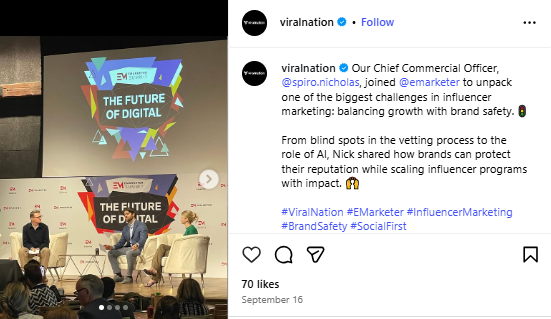
Sometimes, your content needs a little push. You can use paid ads to give new pieces an early life. For example, work with a video marketing agency to create video ads that help you appear higher on YouTube or social media.
Similarly, partner with micro-influencers or creators who align with your message. You can also share your work in online communities, newsletters, or guest publications.
The idea is simple: don’t wait for people to find your content. Bring it to them.
Even with the best intentions, it’s easy to fall into habits that keep your brand out of sight. Avoid these mistakes, and your content starts pulling people in instead of drifting past them.
.gif)
Getting noticed online doesn’t happen by accident. It takes a clear message, consistent storytelling, and content that shows people who you are at a glance.
To turn attention into real business growth, you can work with a partner who knows how to make content perform. INDIRAP is a full-scale video production company Chicago that helps brands of every size create video campaigns built to drive measurable results.
From corporate video production and commercial video production to testimonial videos and explainer content, INDIRAP has delivered over 11,000 projects for more than 900 clients worldwide. Do you want to be the next brand in this list?